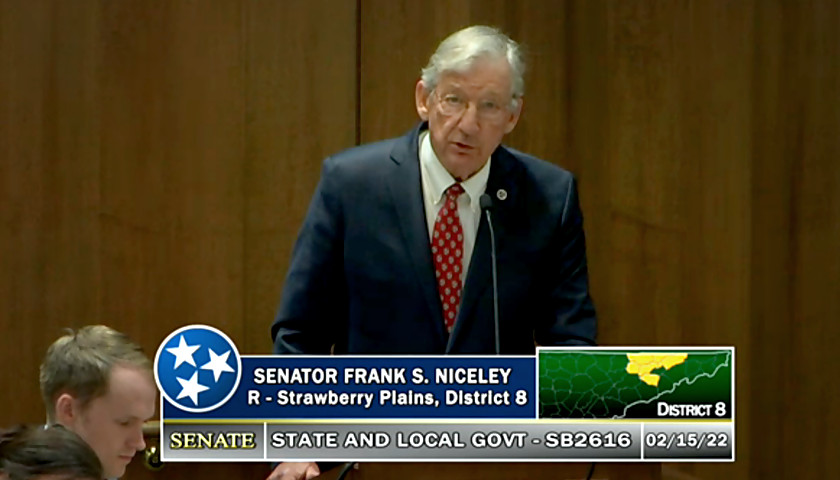Legislation establishing a three-year residency requirement to qualify for the Tennessee primary ballot in U.S. House of Representatives elections passed a key Senate committee on Tuesday.
Tennessee State Senator Frank Niceley (R-TN-08) is the sponsor of SB2616, which states that candidates for U.S. House and U.S. Senate must meet the same residency requirements as Tennessee state representatives and state senators in order to run in a primary in Tennessee. That means a candidate has to have lived in the state for three years.
SB2616 was recommended for passage by the Senate State and Local Government Committee.
Originally, the bill had language which would prohibit a person from being nominated as a candidate for U.S. Senate or U.S. House of Representatives unless they had voted in the three previous Tennessee elections, but the bill was amended prior to consideration of the final version.
SB2616 now heads to the Senate Calendar Committee, whose responsibility it is to schedule the bill for Senate floor consideration.

Left to Right: State Senators Sara Kyle (D-Memphis-SD30), Ed Jackson (R-Jackson-SD27), Bill Powers (R-Clarksville-SD22)
The committee vote was five in favor, one against, and one voted present/not voting. Senators Bill Powers (R-Clarksville-SD22), Ed Jackson (R-Jackson-SD27), Sara Kyle (D-Memphis-SD30), Jeff Yarbro (D-Nashville-SD21), and Page Walley (R-Bolivar-SD26) voted in favor. Senator Todd Gardenhire (R-Chattanooga-SD10) voted no. Ken Yager (R-Kingston-SD-12) voted present/not voting.
Senator Niceley presented the bill to the committee. He said, “The state constitution says requires that you be a resident of the state for seven years before you can run for governor. You have to be a resident for five years in order to run for judge or DA. You have to be a resident for three years to run for the state House or the state Senate. The state constitution and U.S. Constitution are silent on the residency for the Congress and U.S. Senate.”
He then quoted U.S. Supreme Court Associate Justice Antonin Scalia who said, “Nothing in the Constitution deprives the people of each State of the power to prescribe eligibility requirements for the candidates who seek to represent them in Congress. The Constitution is simply silent on this question. And where the Constitution is silent, it raises no bar to action by the States or the people.” Senator Niceley added that it is hard to argue with Justice Scalia.
Senator Niceley then read the amended bill text to the committee, “In order to qualify as a candidate in a primary election for United States senate or for member of the United States house of representatives, a person shall meet the
residency requirements for state senators and representatives contained in the Tennessee constitution. ”
Senator Yager asked committee attorney Josh Houston if he thinks this legislation will pass constitutional muster. Houston responded, “There have been attempts made in the past to add additional qualifications by states for members of Congress. They have all been declared unconstitutional.” Mr. Houston then referred to a 1995 case where the U.S. Supreme Court declared term limits for Congress to be unconstitutional. That case was a 5-4 decision. Justice Scalia wrote a dissent.
Senator Yarbro asked a question whether previous cases dealt with a partisan process, and Houston replied that previous cases applied across the board. He also said that this legislation could possibly raise freedom of association issues.
Senator Niceley spoke again and said there is precedent in the U.S. Constitution saying that the states could have residency requirements for electors. Those previous cases at SCOTUS were under a liberal court. Senator Niceley said he expects different outcomes than those cases with the current makeup of the Supreme Court. He reiterated that Justice Scalia had said that nothing in the U.S. Constitution deprives the people in each state the power to determine eligibility requirements for elections and that the U.S. Constitution is silent on this issue. The 10th Amendment gives the states the power. The Supreme Court today would rule in favor of this legislation.
Senate Minority Leader Yarbro said that he thinks it is a slightly different issue than the counsel raised because it is a primary.
Senator Niceley added that the word “primary” is not mentioned in the U.S. Constitution. If it isn’t mentioned then it is left to the states, per the 10th Amendment.
Senator Yager asked the counsel again if the word “primary” changes constitutionality. Mr. Houston said he wasn’t sure what the constitutional effect would be if it is just limited to primaries and he isn’t sure what the result would be in court. He conceded that this situation would be different than other cases, but he is unsure what that means.
Senator Yager says he respects Senator Niceley and has constitutional questions about the bill. If it is indeed unconstitutional then significant state resources would have to be spent defending it. Senator Yager said that he was not necessarily opposed to the legislation but wants the state to avoid going to court unnecessarily.
Senator Niceley said several times that he believes that the current SCOTUS will uphold this legislation and he also doesn’t know how anyone could argue with Scalia.
Senator Gardenshire said he’s not for this, and that the parties should set the standards, since we are talking about a primary election. In his view, he wants it up to each party to decide who they nominate.
After discussion was exhausted, the committee voted to pass the legislation and referred it to the Senate Calendar Committee.
After the vote, Senator Niceley said that when he and Senator Yarbro agree on something, you must pay attention.
If this legislation passes and is enacted into law, it will significantly shake up the TN-5 GOP primary field, as it renders music video director Robby Starbuck and former Trump administration State Department spokesman Morgan Ortagus ineligible to run in the primary.
Read the amendment:
[wonderplugin_pdf src=”https://thestarnewsnetwork.com/wp-content/uploads/2022/02/SB-2616-Amendment-1.pdf” width=”650px” height=”800px” style=”border:0;”]
– – –
Aaron Gulbransen is a reporter at The Tennessee Star and The Star News Network. Email tips to [email protected].








